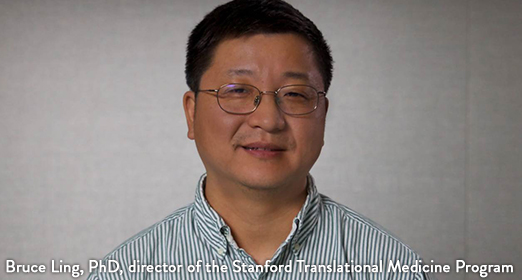Stanford, CA – Thanks to a generous donor, a team of Stanford researchers, led by Bruce Ling, PhD, can now make even greater strides toward understanding and treating devastating childhood conditions including Kawasaki disease. The condition, which can afflict young children—particularly those of Asian descent—causes inflammation in the walls of arteries throughout the body, including the coronary arteries supplying blood to the heart. While treatments for Kawasaki disease are available, early diagnosis and timely treatment are crucial to prevent complications such as aneurisms and acquired heart disease.
Ling, a principal investigator at Stanford University School of Medicine and director of the Stanford Translational Medicine Program, leads an interdisciplinary team working to develop a diagnostic algorithm and improve doctors’ ability to identify Kawasaki disease in their office. The work of Ling’s team has implications for a number of conditions impacting children and adults such as preterm birth, preeclampsia, cancer, congenital heart disease, systemic juvenile idiopathic arthritis, and more.
“Improving the diagnosis and treatment for conditions like Kawasaki disease requires an interdisciplinary approach,” explains Harvey Cohen, MD, PhD, the Deborah E. Addicott – John A. Kriewall and Elizabeth A. Haehl Family Professor in Pediatrics at the School of Medicine and Lucile Packard Children’s Hospital Stanford.
A generous gift of $300,000 from Luming Ai, a life sciences pioneer from China, will help further advance the work of Ling’s team, which consists of clinicians, scientists, physician-scientists, engineers, mathematicians, and others researchers.
“The work that Mr. Ai’s gift will support is considered ‘discovery’ research, meaning it is at the forefront of science,” notes Cohen. “Discovery research is dynamic and vital, but sometimes public and private research agencies including the National Institutes of Health are hesitant to provide funding until there is an established history of findings—which can take years. In the meantime, philanthropy like we’ve seen from Mr. Ai is vitally important to do this discovery research.”
In addition to supporting cutting-edge science, Mr. Ai’s gift highlights an ongoing partnership between Stanford University School of Medicine and Chinese researchers. The medical school has a long tradition of collaboration between researchers here and in China, as well as fostering Chinese researchers who receive training here and then return home to continue their work.
“Dr. Ling’s work is a great example of Stanford scientists partnering with Chinese researchers to improve diagnosis, prognosis, and treatments,” Cohen says. “And it extends far beyond Kawasaki disease to a number of other conditions. Ultimately, this work strengthens medical care both here and abroad. We are honored by Mr. Ai’s support, and look forward to more partnerships between Lucile Packard Children’s Hospital, Stanford University School of Medicine, and the global community. There are so many benefits for scientists and patients as we advance science through collaboration.”
For questions, please email or call Megan Alpers at (650) 498-2597.
